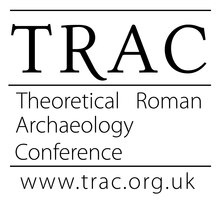 Logo of TRAC | |
| Predecessor | Theoretical Archaeology Group |
|---|---|
| Formation | 23–24 March 1991 |
| Founder | Eleanor Scott |
| Founded at | University of Newcastle |
| Purpose | Promotion of a theoretical discourse in Anglophone Roman archaeology |
| Website | http://trac.org.uk/ |
The Theoretical Roman Archaeology Conference (TRAC) is an academic organisation and conference which was designed to be an arena for open discussion of archaeological theory in Roman archaeology.
YouTube Encyclopedic
-
1/3Views:3491 051315
-
Earthquakes and the Structuring of Greco-Roman Society by Amanda Gaggioli
-
Post-Romanisation Perspectives on the Roman West, Andrew Gardner
-
01 Hella Eckardt Introduction & Britannia in numbers
Transcription
History
TRAC, organised initially by Eleanor Scott, was held for the first time in the Department of Archaeology at the University of Newcastle on 23–24 March 1991.[1][2]
Historically, one of TRAC's main focuses has been on the debates surrounding Romanisation, and this dominated many of the volumes during the 1990s. However, since the early 2000s, there have been a rising number of discussions relating to post-imperial and post-colonial approaches to the Roman world.[3]
TRAC was originally established as a one-off event, but, the interest that this conference garnered led to it becoming an annual fixture. After the initial meeting in Newcastle, TRAC has been run at many of the major archaeology departments in the UK and has even been organised at institutions in Europe and America.[citation needed]
TRAC was joined with RAC (the Roman Archaeology Conference), organised by the Roman Society, at Reading University in 1995.[4]
Participants
Many of the participants in TRAC are early career scholars or postgraduates who use the conference to outline their own original research and attempt to re-define existing models about the Roman past.[5]
Andrew Gardner, in an article in TRAC 2005, raised the issue of a gender imbalance in the history of TRAC conferences.[6] However, in more recent article, Eleanor Scott concluded that TRAC had given an equal platform to female archaeologists working within Roman archaeology.[7] In the 2010s, TRAC has becoming increasingly international.[8]
Annual Meeting Locations
| 29th | Canterbury | 11-14 April 2019 |
| 28th | University of Edinburgh | 12-14 April 2018 |
| 27th | Durham University | 28-31 March 2017 |
| 26th | Rome | 16-19 March 2016 |
| 25th | University of Leicester | 27-29 March 2015 |
| 24th | University of Reading | 28-30 March 2014 |
| 23rd | King's College London | 4-6 April 2013 |
| 22nd | Frankfurt | 29 - 1 March April 2012 |
| 21st | Newcastle | 14-17 April 2011 |
| 20th | University of Oxford | 25-28 March 2010 |
| 19th | Michigan/Southampton | 3-5 April 2009/April 17–18, 2009 |
| 18th | Amsterdam | 4-6 March 2008 |
| 17th | London | 29 - 1 March April 2007 |
| 16th | Canterbury | 24-25 March 2006 |
| 15th | Birmingham | 31-3 March April, 2005 |
| 14th | Durham University | 26-27 March 2004 |
| 13th | University of Leicester | 3-6 April 2003 |
Publications
TRAC was previously published as a set of conference proceedings.[9] From TRAC 2017 it moved to an online open access journal, the Theoretical Roman Archaeology Journal, published by the Open Library of Humanities.[10][11]
Subjects
- Romanisation
- Post-colonial archaeology
- Gender and material cultural
- Material cultural theory
References
- ^ Scott, Eleanor, ed. (1993). Theoretical Roman archaeology : first conference proceedings : [23 - 24 March 1991, Newcastle]. Aldershot: Avebury. pp. 1–2. ISBN 1856287033.
- ^ "Bio and career". ELEANOR SCOTT ARCHAEOLOGY. Retrieved 24 February 2018.
- ^ Millet, Martin (2016). "Roman Britain since Haverfield". In Millett, Martin; Revell, Louise; Moore, Alison (eds.). The Oxford Handbook of Roman Britain. Oxford University Press. pp. 22–42.
- ^ "RAC Archive « Roman Archaeology Conference". romansocietyrac.ac.uk. p. 3. Retrieved 24 February 2018.
- ^ Laurence, Ray (1999). "Theoretical Roman Archaeology". Britannia. 30: 387–390. doi:10.2307/526691. JSTOR 526691. S2CID 163928619.
- ^ Gardner, Andrew (2006). "The future of TRAC". In Croxford, Ben; Goodchild, Helen; Lucas, Jason; Rav, Nick (eds.). TRAC 2005 proceedings of the fifteenth annual theoretical roman archaeology conference which took place at the University of Birmingham, 31st March-3rd April 2005. Theoretical Roman Archaeology Journal. No. 2005. Oxford: Oxbow books. pp. 128–137. doi:10.16995/TRAC2005_128_137. ISBN 1842072196.

- ^ Scott, Eleanor (2012). "Introduction: The Theoretical Roman Archaeology turns 21". In Duggan, Maria; McIntosh, Frances; Rohl, Darrell J. (eds.). TRAC 2011 : proceedings of the Twenty-First Annual Theoretical Roman Archaeology Conference, which took place at the University of Newcastle, 14-17 April 2011. Oxford: Oxbow Books. pp. 1–3. doi:10.16995/TRAC2011_1_3. ISBN 978-1842174999.

- ^ Michielin, Lucia; O’Donnell, Kathleen; Astolfi, Martina (17 December 2019). "Increasing International Perspectives in Theoretical Roman Archaeology". Theoretical Roman Archaeology Journal. 2 (1): 11. doi:10.16995/traj.415. ISSN 2515-2289.
- ^ "TRAC Proceedings". TRAC. 11 March 2013.
- ^ "Theoretical Roman Archaeology Journal". TRAC. 10 May 2017.
- ^ Hanscam, Emily; Quiery, Jonathan (30 November 2018). "From TRAC to TRAJ: Widening Debates in Roman Archaeology". Theoretical Roman Archaeology Journal. 1 (1). doi:10.16995/traj.365. ISSN 2515-2289.
